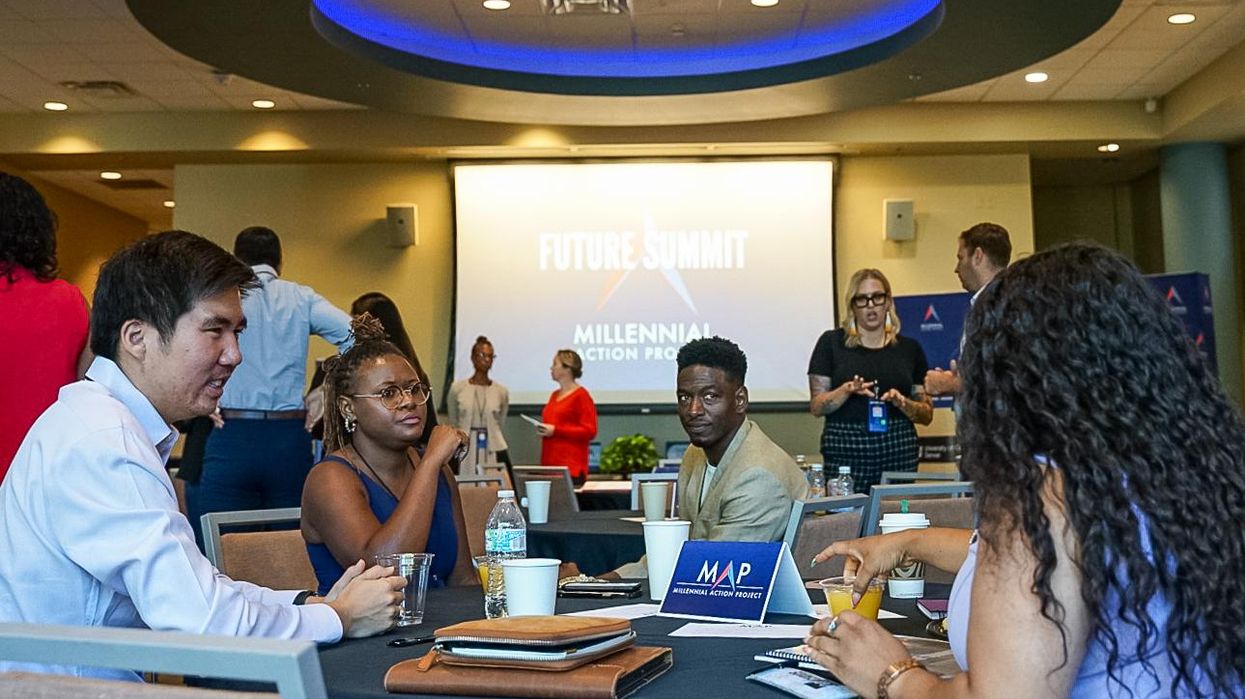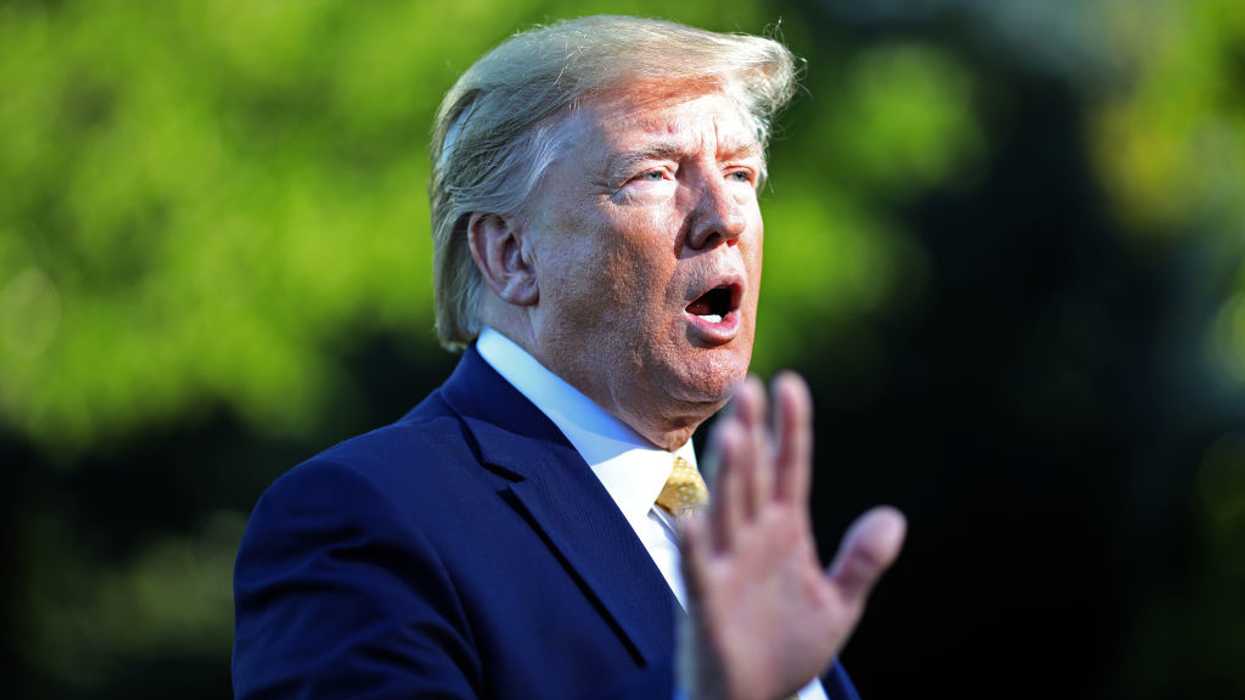Zaidane is the president and CEO of the Millennial Action Project.
History favors the brave – or so the saying goes. From a young age, we are taught of historical heroes, people who stepped out against the status quo and followed their convictions. These acts of bravery transformed the world: advances in civil rights, technological breakthroughs like electricity and the internet, and so much more.
Today, we must summon that bravery once more as Americans pursue one of our biggest, most important challenges yet: building the largest, multiracial, multiethnic, multireligious democracy in the history of the world.
That undertaking is a moonshot. And while history teaches us how to look back and link certain moments or courage else we risk missing out on favorable outcomes, it’s a whole different story when that bravery is for a yet unwritten future.
Luckily for all of us, there are courageous leaders all across the country already writing that future — and a few weeks ago I got to spend a full weekend with many of them, recommitting to the notion of a more inclusive democracy.
At the Millennial Action Project’s sixth annual Future Summit, young state legislators from across the country set aside differences to listen, learn and laugh with one another. The summit focuses on collaborative policy solutions, but also on the collaborative policy makers who lead these solutions, and the ways in which they must navigate a toxic culture in order to build new governing coalitions. In conversations with many of them, I heard firsthand the burdens they carry in doing this work:
“I receive death threats daily.” “I get harassed online.” “I’m the first in my family to get a diploma, let alone be elected into public office.” These are just a sliver of the comments I’ve heard about what it’s like being a young person in elected office. The conditions are tough to say the least: These lawmakers often have little to no support, and they are frequently on the receiving end of hate and criticism.
Burnout is a common risk among these leaders — and who could be surprised? According to the National Conference of State Legislators, the average pay of a state legislator is $33,000, and most have no full-time staff. Many legislators must take on a second job or side gigs in order to make ends meet. One legislator shared at the Future Summit: “When I first ran for office, I knew we were going to have to pinch pennies. We’d essentially have to live off my wife’s salary.” For many young legislators, a reality of their public service is they are underpaid, understaffed and overworked.
Access to forums like the Future Summit, where young legislators can relate to one another around the shared challenges and joys of their roles as elected officials, can be deeply reenergizing. These moments help show these courageous leaders that they are not alone in doing the work of building a more functional democracy; events like the Future Summit also provide unique and meaningful opportunities for learning across lines of political, ideological and geographical difference. Take it from Arkansas state Rep. Aaron Pilkington, who remarked: “MAP has been a resource to me. ... The most important thing has been facilitating the conversation across party lines and having a space where people can be genuine and vulnerable.”
Kansas Rep. Jo Ella Hoya had a similar takeaway: “My sense of the room and the people at the Future Summit ... we all felt a calling and we wanted to serve. And seeing that genuine desire to make our states a better place, to make our country a better place, to make the world a better place is inspiring.”
The summit was a deeply needed recharging moment for these brave leaders. To be brave is not to be without fear or discomfort — it is to press forward in spite of it. By building a strong and diverse network of their peers, young elected leaders are developing the resiliency to buck the status quo, and lead our country into an era of democratic renewal.
The future is still uncertain. Luckily, the young legislators in MAP’s network are not discouraged by uncertainty. The yet unwritten future is their opportunity, their call-to-action and their collective mission. While the saying goes, “history favors the brave,” that doesn’t quite capture the full truth. From where I sit, the future favors the brave.




















Eric Trump, the newly appointed ALT5 board director of World Liberty Financial, walks outside of the NASDAQ in Times Square as they mark the $1.5- billion partnership between World Liberty Financial and ALT5 Sigma with the ringing of the NASDAQ opening bell, on Aug. 13, 2025, in New York City.
Why does the Trump family always get a pass?
Deputy Attorney General Todd Blanche joined ABC’s “This Week” on Sunday to defend or explain a lot of controversies for the Trump administration: the Epstein files release, the events in Minneapolis, etc. He was also asked about possible conflicts of interest between President Trump’s family business and his job. Specifically, Blanche was asked about a very sketchy deal Trump’s son Eric signed with the UAE’s national security adviser, Sheikh Tahnoon.
Shortly before Trump was inaugurated in early 2025, Tahnoon invested $500 million in the Trump-owned World Liberty, a then newly launched cryptocurrency outfit. A few months later, UAE was granted permission to purchase sensitive American AI chips. According to the Wall Street Journal, which broke the story, “the deal marks something unprecedented in American politics: a foreign government official taking a major ownership stake in an incoming U.S. president’s company.”
“How do you respond to those who say this is a serious conflict of interest?” ABC host George Stephanopoulos asked.
“I love it when these papers talk about something being unprecedented or never happening before,” Blanche replied, “as if the Biden family and the Biden administration didn’t do exactly the same thing, and they were just in office.”
Blanche went on to boast about how the president is utterly transparent regarding his questionable business practices: “I don’t have a comment on it beyond Trump has been completely transparent when his family travels for business reasons. They don’t do so in secret. We don’t learn about it when we find a laptop a few years later. We learn about it when it’s happening.”
Sadly, Stephanopoulos didn’t offer the obvious response, which may have gone something like this: “OK, but the president and countless leading Republicans insisted that President Biden was the head of what they dubbed ‘the Biden Crime family’ and insisted his business dealings were corrupt, and indeed that his corruption merited impeachment. So how is being ‘transparent’ about similar corruption a defense?”
Now, I should be clear that I do think the Biden family’s business dealings were corrupt, whether or not laws were broken. Others disagree. I also think Trump’s business dealings appear to be worse in many ways than even what Biden was alleged to have done. But none of that is relevant. The standard set by Trump and Republicans is the relevant political standard, and by the deputy attorney general’s own account, the Trump administration is doing “exactly the same thing,” just more openly.
Since when is being more transparent about wrongdoing a defense? Try telling a cop or judge, “Yes, I robbed that bank. I’ve been completely transparent about that. So, what’s the big deal?”
This is just a small example of the broader dysfunction in the way we talk about politics.
Americans have a special hatred for hypocrisy. I think it goes back to the founding era. As Alexis de Tocqueville observed in “Democracy In America,” the old world had a different way of dealing with the moral shortcomings of leaders. Rank had its privileges. Nobles, never mind kings, were entitled to behave in ways that were forbidden to the little people.
In America, titles of nobility were banned in the Constitution and in our democratic culture. In a society built on notions of equality (the obvious exceptions of Black people, women, Native Americans notwithstanding) no one has access to special carve-outs or exemptions as to what is right and wrong. Claiming them, particularly in secret, feels like a betrayal against the whole idea of equality.
The problem in the modern era is that elites — of all ideological stripes — have violated that bargain. The result isn’t that we’ve abandoned any notion of right and wrong. Instead, by elevating hypocrisy to the greatest of sins, we end up weaponizing the principles, using them as a cudgel against the other side but not against our own.
Pick an issue: violent rhetoric by politicians, sexual misconduct, corruption and so on. With every revelation, almost immediately the debate becomes a riot of whataboutism. Team A says that Team B has no right to criticize because they did the same thing. Team B points out that Team A has switched positions. Everyone has a point. And everyone is missing the point.
Sure, hypocrisy is a moral failing, and partisan inconsistency is an intellectual one. But neither changes the objective facts. This is something you’re supposed to learn as a child: It doesn’t matter what everyone else is doing or saying, wrong is wrong. It’s also something lawyers like Mr. Blanche are supposed to know. Telling a judge that the hypocrisy of the prosecutor — or your client’s transparency — means your client did nothing wrong would earn you nothing but a laugh.
Jonah Goldberg is editor-in-chief of The Dispatch and the host of The Remnant podcast. His Twitter handle is @JonahDispatch.